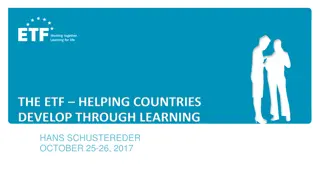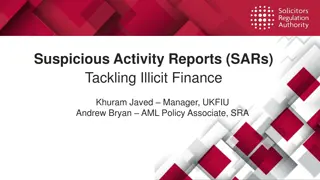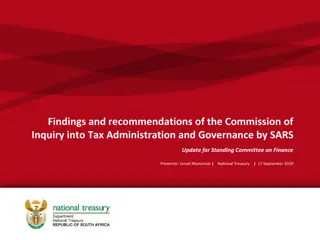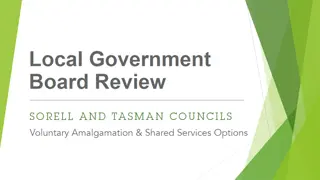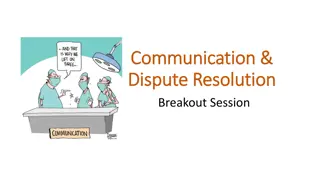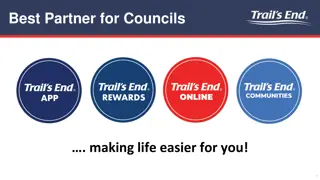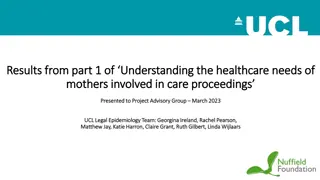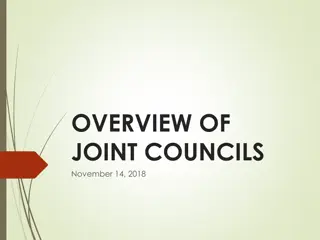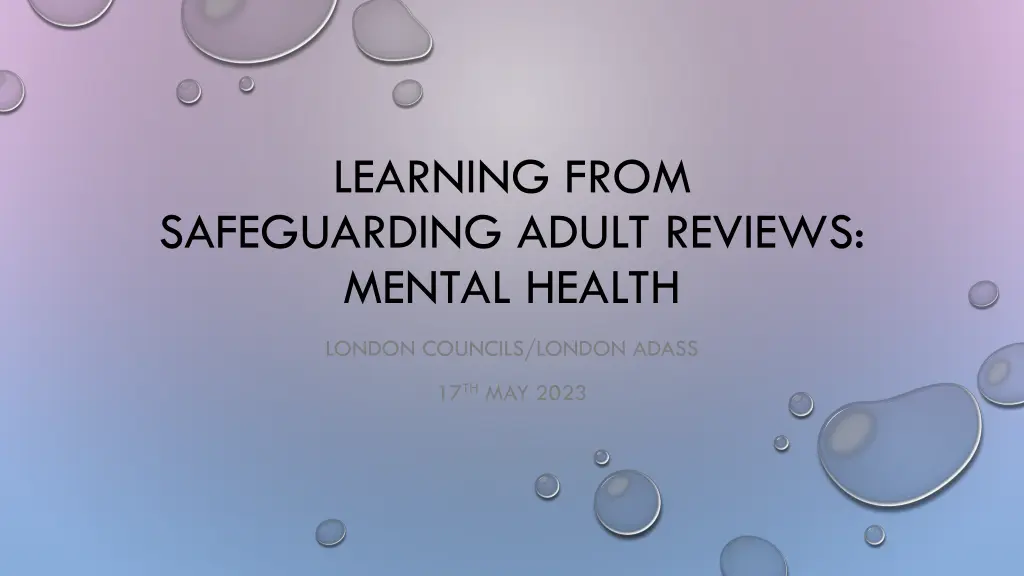
Insights into Safeguarding Adult Reviews in London: Mental Health & Gender Analysis
Explore key findings from safeguarding adult reviews in London councils, focusing on mental health issues and gender disparities. Discover specific case examples, practice shortfalls in alcohol-related reviews, and recommendations for improvement in safeguarding practices.
Download Presentation

Please find below an Image/Link to download the presentation.
The content on the website is provided AS IS for your information and personal use only. It may not be sold, licensed, or shared on other websites without obtaining consent from the author. If you encounter any issues during the download, it is possible that the publisher has removed the file from their server.
You are allowed to download the files provided on this website for personal or commercial use, subject to the condition that they are used lawfully. All files are the property of their respective owners.
The content on the website is provided AS IS for your information and personal use only. It may not be sold, licensed, or shared on other websites without obtaining consent from the author.
E N D
Presentation Transcript
LEARNING FROM SAFEGUARDING ADULT REVIEWS: MENTAL HEALTH LONDON COUNCILS/LONDON ADASS 17THMAY 2023
Examples of specific issues in the 231 cases in the national analysis (2017-2019) 57 cases involve alcohol-dependence issues (25%) 25 reviews involving homelessness (11%) 35 cases involving skin integrity (15%) 34 cases involving diabetes (15%) 161 cases involving mental health (70%) Advocacy referred to in 64 SARs (28%) Focus on think family in 12 SARs (5%)
FINDINGS FROM THE NATIONAL ANALYSIS OF SARS (2017-2019) PSYCHOLOGICAL AND EMOTIONAL ABUSE, AND MODERN SLAVERY MORE PREVALENT FOR WOMEN GENDER DIFFERS SIGNIFICANTLY BETWEEN SECTION 42 AND SECTION 44 WOMEN IN 59% OF ENQUIRIES BUT 41% OF SAFEGUARDING ADULT REVIEWS LITTLE EXPLICIT ATTENTION IN PRACTICE (AND IN SARS) TO THE IMPACT OF GENDER AND OTHER PROTECTED CHARACTERISTICS IN THE EQUALITY ACT 2010 OCCASIONAL RECOMMENDATIONS THAT TRAINING, RISK ASSESSMENTS AND CASE AUDITS SHOULD INCLUDE A FOCUS ON GENDER AND OTHER PROTECTED CHARACTERISTICS IMPROVEMENT PRIORITY 23 RECOMMENDED THAT SABS FOCUS ON HOW NEEDS AND RISKS ARE ASSESSED AND MET RESPONDING TO GENDER AND OTHER PROTECTED CHARACTERISTICS
Practice shortfalls in alcohol-related reviews Direct practice Partnership work Service response Superficial or missed assessments (impact of alcohol on capacity) Focus on single issues rather than holistic (risk) assessment Lack of think family approach Lack of curiosity (History) Reliance on self-report Labelling and prejudice, assumptions about life- style choice Alcohol abuse not seen as self-neglect Loss of services Lack of services (mental health support; supported accommodation; outreach) Lack of policies and protocols to guide staff Need for training Need for more robust, humane and flexible approach Mental health and drug and alcohol services not working together Inflexible thresholds and referral bouncing Law seen as complex (mental capacity and alcohol- dependence; mental health and alcohol-dependence) Absence of safeguarding referrals
Findings on multiple exclusion homelessness 14 references to good practice Rapport building, expression of humanity, provision of care and support and emergency accommodation, health services outreach, colocation of practitioners, clear referrals 42 references to practice shortfalls Delayed or missing risk, mental health and mental capacity assessments, unclear referral pathways, discharges to no fixed abode, lack of use of available legal rules, absence of consideration of vulnerability 18 recommendations Wrap-around support (health and care and support as well as housing), coordination of response, legal literacy, commissioning for health and social care as well as housing, governance oversight
Findings on mental health Practice shortfalls Good practice Failure to differentiate between mental health and MHA 1983 assessments Poor (risk) assessments and reviews Failure to think family and assess dynamics Lack of outreach Case bouncing/revolving door Referral pathways into mental health who can refer? Lack of secondary mental health services for people not in immediate crisis Lack of understanding of MHA 1983 Failure to use safeguarding procedures CPA guidance not followed Parity of esteem, for example mental health overshadowing physical health concerns Timely and thorough assessments Understanding and use of law Referral practice Effective collaboration and communication Use of adult safeguarding Assertive outreach and follow-up
Findings and recommendations: advocacy Do practitioners and commissioners give sufficient attention to advocacy? Is SAB oversight of advocacy sufficient? Notable findings on advocacy Advocacy not considered - omissions Good advocate practice recorded Provided but sometimes very late Recommendations about advocacy Ensure advocacy considered Involve advocates Services to review practice of engaging with advocates Services to review commissioning SABs to audit provision and practice for assurance SABs to develop guidance for staff Waiting list adequacy of provision Cultural barriers to engaging advocates Lack of understanding of role of advocates Individuals not engaging with advocates Use of family and/or staff as advocates Training National governance of advocacy
FINDINGS FROM RECENT REVIEWS LACK OF LEGAL LITERACY ABOUT NEAREST RELATIVE AND POWERS OF ENTRY CONCERN ABOUT LACK OF URGENCY IN MENTAL HEALTH ASSESSMENTS SHORTAGE OF MENTAL HEALTH BEDS SHORTCOMINGS IN DELIVERY OF SECTION 117 AFTER-CARE PLANS CONCERNS ABOUT THE INTERFACE BETWEEN PRIMARY CARE AND SECONDARY MENTAL HEALTH CARE CONCERNS ABOUT THE ABSENCE OF A TRAUMA-INFORMED APPROACH CONCERNS ABOUT LACK OF ACCESS TO PSYCHOLOGICAL THERAPIES CONCERNS THAT ARTICLE 8 OVERSHADOWS ARTICLE 2 IMPACT OF MENTAL ILL-HEALTH (AND BRAIN INJURY) ON DECISIONAL AND EXECUTIVE CAPACITY
The analytic framework: five domains Legal and policy context SAB governance The organisations around the team The interagency team Direct work with the adult
VOICES OF EXPERTS BY EXPERIENCE WHEN ASKED WHAT HE NEEDED, TERENCE REPLIED: SOME LOVE, MAN. FAMILY ENVIRONMENT. SUPPORT. HE WANTED TO BE PART OF SOMETHING REAL, PART OF REAL SOCIETY AND NOT JUST THE SYSTEM . (REPORTED IN A THEMATIC REVIEW ON PEOPLE WHO SLEEP ROUGH, WORCESTERSHIRE SAB (2020)). FROM THE LEEDS THEMATIC REVIEW (2020): I LOST EVERYTHING ALL AT ONCE: MY JOB, MY FAMILY, MY HOPE. WITHOUT [THIS HELP IN LEEDS], I D ALREADY BE DEAD. I VE NO DOUBTS ABOUT THAT. IF THE ELEMENTS HADN T GOT ME, I WOULD HAVE GOT ME. SOMETIMES I HAVE ROLLED UP TO THIS VAN IN A REAL MESS AND THEY HAVE OFFERED HELP AND SUPPORT AND GOT MY HEAD STRAIGHT. MS I S PARTNER COMMENTED (TOWER HAMLETS SAB (2020) THEMATIC REVIEW): AT TIMES SHE COULD NOT HELP HERSELF BECAUSE OF THE FEELINGS THAT WERE RESURFACING; ACCESS TO NON-JUDGEMENTAL SERVICES WAS VITAL AND HELPFUL, AND THAT SUPPORT IS ESPECIALLY IMPORTANT WHEN INDIVIDUALS ARE STRIVING TO BE ALCOHOL AND DRUG FREE. IT WAS DURING THESE TIMES THAT STRESS, ANXIETY AND PAINFUL FEELINGS COULD BUBBLE UP , PROMPTING A RETURN TO SUBSTANCE MISUSE TO SUPPRESS WHAT IT WAS VERY HARD TO ACKNOWLEDGE AND WORK THROUGH.
HELENS MESSAGE WHAT HOPE DO I HAVE TO EVER RECOVER OR FEEL BETTER WHEN THIS KEEPS HAPPENING? I ENCOURAGE ANYONE WHO TRULY CARES TO COME AND SPEND A DAY WITH ME TO SEE WHAT IT S LIKE TO BE HELPLESS, WHEN DAYS FEEL LIKE WEEKS, WEEKS FEEL LIKE MONTHS. (REPORTED IN A LUTON SAB SAR).
Learning from the voices of lived experience Seeing the whole person in their situation A trauma-informed, whole system response to the person in context The problem is not the problem; it is the solution that is the problem. Tackling symptoms is less effective than addressing causes. Attempting to change someone s behaviour without understanding its survival function will prove unsuccessful. The problem is a way of coping, however dysfunctional it may appear. Too often we are responding to symptoms and not causes. Put another way, individuals experiencing multiple exclusion homelessness are in a life threatening double bind, driven addictively to avoid suffering through ways that only deepen their suffering.
IS SAFEGUARDING PERSONAL? EVIDENCE OF UNCONSCIOUS BIAS POOR RECORDING OF ETHNICITY LIMITED CONSIDERATION OF IMPACT OF RACE, CULTURE, GENDER, SEXUALITY, ETHNICITY HOW MUCH DO WE REALLY KNOW ABOUT THE PEOPLE WE WORK WITH? ARE WE SUFFICIENTLY SKILLED IN ASKING CARE-FRONTATIONAL QUESTIONS, IN CONCERNED CURIOSITY?
DIRECT PRACTICE BEST PRACTICE Assessment of care & support, and mental health Person-centred, relationship- based practice Professional curiosity (history) Transitions opportunities not cliff edges Assessment & review of risk and capacity Family involvement (think family) Balancing autonomy with a duty of care Availability of specialist advice Legal literacy
INTER-ORGANISATIONAL ENVIRONMENT BEST PRACTICE Guidance on balancing autonomy with a duty of care Information- sharing & communication Working together on complex, stuck and stalled cases Use of multi- agency meetings and safeguarding enquiries Clear roles and responsibilities (lead agencies and key workers) Shared record- keeping
ORGANISATIONAL ENVIRONMENT BEST PRACTICE Development, dissemination & review of guidance Clarifying management responsibilities and oversight Staffing, supervision, support & training Culture of openness, challenge and escalation Commissioning & contract monitoring Recording standards
SAB GOVERNANCE BEST PRACTICE Audit & quality assurance of what good looks like Review of Multi-agency training management of SARs Use of SARs to inform policy development, practice audits and training Workplace as well as workforce development Continual review of outcome of recommendations
LEWISHAM: MENTAL HEALTH SARS MICHAEL RESPONSE TO MENTAL HEALTH CRISIS, AWARENESS OF MHA 1983, ESPECIALLY NEAREST RELATIVE LEE ALCOHOL ABUSE, PHYSICAL AND MENTAL ILL-HEALTH, RESPONSE TO PEOPLE WHO ARE MISSING, DUAL DIAGNOSIS MIA HOMELESSNESS, SUBSTANCE MISUSE AND DOMESTIC ABUSE, CAPACITY ASSESSMENTS, SELF-NEGLECT, ENGAGEMENT, WORKING TOGETHER ADULT Z SECTION 117 MHA 1983, CAPACITY ASSESSMENTS, AWARENESS OF MHA 1983, ESPECIALLY NEAREST RELATIVE AMANDA SUBSTANCE MISUSE, MENTAL ILL-HEALTH, MISSING FROM A CARE HOME, FOUND DECEASED IN A DERELICT GARAGE EILEEN DEAN ASSAULTED IN A CARE HOME BY ANOTHER RESIDENT AND DIED OF HER INJURIES.
THEMATIC OVERVIEW AND SAB RESPONSE UNDERSTANDING AND APPLICATION OF MCA 2005 TRAINING FROM LEADING MENTAL CAPACITY SPECIALISTS UNDERSTANDING AND APPLICATION OF MHA 1983 TRAINING OPPORTUNITIES, WHOLE SYSTEM FOCUS ON UNCONSCIOUS BIAS; ASSURANCE REPORTING ON AMHP PROVISION AND ON SECTION 117 AFTER-CARE PLANS SELF-NEGLECT REVISED PROCEDURES AND TRAINING PLACEMENTS ASSURANCE REPORTING ON PROVIDER CONCERNS, QUALITY ASSURANCE MECHANISMS, ASSURANCE REPORTING ON PLACEMENT REVIEWS UNDERSTANDING AND APPLICATION OF SECTION 42 CARE ACT 2014 SOUGHT ASSURANCE FROM ASC AND MENTAL HEALTH TRUST
LEWISHAM SAB RESPONSE (2) ALL REVIEWS HAVE BEEN PUBLISHED AND BRIEFINGS ARE ALSO DISSEMINATED LEARNING EVENTS HAVE BEEN ORGANISED TO COINCIDE WITH PUBLICATION (600 PEOPLE BOOKED ON OUR NEXT EVENT) REVIEW FINDINGS AND RECOMMENDATIONS ARE REVISITED IN LEARNING EVENTS TO HEAR FROM PRACTITIONERS, OPERATIONAL MANAGERS AND SENIOR LEADERS ABOUT WHAT HAS (NOT YET) CHANGED SAB HAS ESCALATED SOME CONCERNS TO THE LONDON REGION USING THE ESCALATION PATHWAY AGREED WITH DHSC. SAB HAS FOCUSED ON LEARNING FROM SARS PUBLISHED ELSEWHERE TO ANSWER THE QUESTION COULD THIS HAPPEN HERE? AND TO SEEK ASSURANCE, FOR EXAMPLE ABOUT TRANSITIONAL SAFEGUARDING AND ABOUT OUT OF AUTHORITY PLACEMENTS.
LEWISHAM SARS (MENTAL HEALTH) OVERVIEW (1) WE HAVE SEEN AN INCREASE ANNUALLY IN THE NUMBER OF SAR REFERRALS. MENTAL ILL-HEALTH IS THE HIGHEST SUBJECT REFERENCED IN SAR NOTIFICATIONS. OUR CONVERSION RATE FROM REFERRAL TO COMMISSIONING A MANDATORY OR DISCRETIONARY REVIEW IS 43%. THE TEAM IS BUSY! THERE IS A DISCONNECT BETWEEN SECTION 42 ENQUIRIES AND SARS - ORGANISATIONAL ABUSE IS ONE OF THE TWO MOSTLY COMMONLY REPORTED TYPES OF ABUSE IN THE 21 SAR NOTIFICATIONS IN LEWISHAM SINCE 2018 (ALONG WITH NEGLECT & ACTS OR OMISSION), BUT OVER THAT PERIOD LESS THAN 5% OF THE CONCLUDED S.42 ENQUIRIES IN THE BOROUGH ARE FOR THAT SUBJECT. IN 2021-22 MENTAL ILL-HEALTH WAS THE MAIN SOURCE OF SUPPORT IN ONLY 5% OF THE CONCLUDED S.42 ENQUIRIES CONDUCTED IN LEWISHAM, BUT THIS SUBJECT IS A KEY FEATURE IN 66% OF THE SARS EITHER ALREADY PUBLISHED, OR IN PROGRESS IN THE BOROUGH.
OVERVIEW (2) THE ETHNICITY OF THOSE ADULTS LINKED TO SARS IN LEWISHAM IS BROADLY CONSISTENT WITH THE WIDER DEMOGRAPHIC PROFILE FOR THE BOROUGH. HOWEVER, WHEN YOU CROSS-REFERENCE THIS TO THE SUBJECT OF MENTAL ILL-HEALTH, ADULTS FROM BLACK, BLACK BRITISH, BLACK CARIBBEAN OR AFRICAN BACKGROUNDS ARE DISPROPORTIONATELY REPRESENTED AND AROUND TWICE AS LIKELY TO BE A SUBJECT OF A SAR NOTIFICATION. THE AGE OF INDIVIDUALS WHOSE LIVES ARE THE FOCUS OF SARS IS YOUNGER THAN THAT FOR SECTION 42 ENQUIRIES.
QUESTIONS FOR US ALL HOW OFTEN DO WE TAKE A TEMPERATURE CHECK ABOUT HOW CLOSE SERVICES ARE GETTING TO THE EVIDENCE-BASE DRAWN FROM VOICES OF PEOPLE WITH LIVED EXPERIENCE, RESEARCH, SARS AND PRACTITIONER/MANAGER FEEDBACK THE ENABLERS AND THE BARRIERS? SARS PREDOMINANTLY FOCUS ON ANSWERING THE QUESTION WHAT? SARS PREDOMINANTLY ZOOM INWARDS RATHER THAN ALSO ZOOMING OUT INTO THE POLITICAL, SOCIAL, ECONOMIC AND LEGAL CONTEXT IN WHICH ADULT SAFEGUARDING IS SITUATED IS THIS AN UNTOLD OR UNTELLABLE STORY? HOW DO WE ANSWER THE QUESTION WHY? WHAT ARE OUR AMBITIONS FOR ADULT SAFEGUARDING IN TERMS OF DIRECT PRACTICE, TEAM AROUND THE PERSON, ORGANISATIONAL SUPPORT AND GOVERNANCE?
PROFESSOR MICHAEL PRESTON-SHOOT INDEPENDENT CHAIR, GREENWICH SAFEGUARDING ADULTS BOARD SAR AUTHOR ADULT SAFEGUARDING CONSULTANT MICHAEL.PRESTON- SHOOT@BEDS.AC.UK INDEPENDENT CHAIR, LEWISHAM SAFEGUARDING ADULTS BOARD INDEPENDENT CHAIR, SOMERSET SAFEGUARDING ADULTS BOARD JOINT CONVENOR, NATIONAL NETWORK SAB CHAIRS







